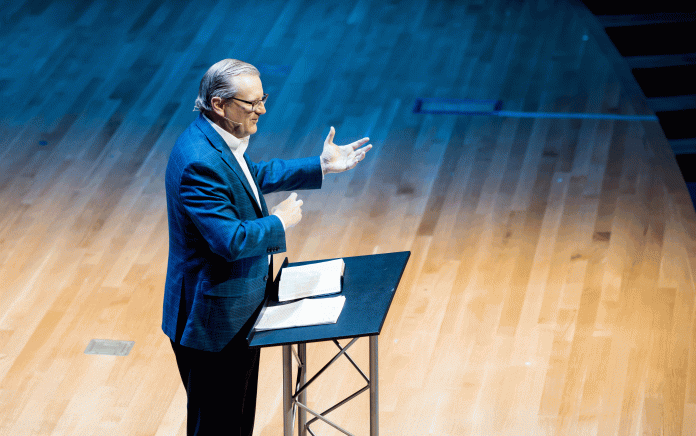Philip Ryken is the eighth president of Wheaton College in Wheaton, Illinois, a council member of The Gospel Coalition, and has authored over 50 books and Bible commentaries. This article is adapted from a talk Ryken gave at the 2022 Amplify Outreach Conference. To register for this year’s conference on October 17th & 18th go to AmplifyConference.org.
There’s nothing better than hearing the story of how someone has come to faith in Christ. I love the story of a little boy who heard time and again that Jesus died for his sins and that if he trusted in him, he would have eternal life. One day, the boy went home, knelt in his bedroom, and asked Jesus to be his Savior. And then, night after night as he went to sleep, he’d sing, “I have decided to follow Jesus, no turning back, no turning back.” I love this story because it is my own.
Every testimony speaks of the grace of our Lord Jesus Christ. Telling these stories used to be commonplace within the church. In fact, it was one key to identifying an evangelical church. Have we forgotten this?
When we receive the good news of Jesus Christ, it helps us understand who we are. The same thing happens when we share the good news of Jesus Christ: we define again who we are as followers of Christ, as an evangelical church. For over a century and a half, Wheaton College has been thinking about what it means to be an evangelical. This is especially true now, when our country is so deeply divided: theology and politics, race and justice, sex and gender. The church is divided too. Today, there is great dissonance and division within the evangelical church.
As a church historian and lifelong evangelical, I see our present polarization as more disruptive to Christian unity and more destructive to the task of evangelism than anything in my lifetime. There are many contributing factors that inform our current situation: (1) politics trumps theology, or at least is on the same level; (2) we tend to communicate only with those who agree with us; (3) internet algorithms push us toward hyper-partisanship, as we are steered toward inhabiting very different communication networks, and thus work with widely disparate facts and perspectives of the world; (4) we have a strong instinct to separate and cancel the people with whom we disagree; and (5) all of us have fears, which are exacerbated by the challenges within the church and the broader culture today.
As the evangelical church, we are in danger of forgetting that God calls us to move toward one another and our neighbors in love. We need a message that unifies us, as seen in 1 Corinthians 15: “For I delivered to you as of first importance what I also received: that Christ died for our sins in accordance with the Scriptures, that he was buried, that he was raised on the third day in accordance with the Scriptures, and that he appeared to Cephas, then to the Twelve” (vv. 3–5).
This is the simple message of the gospel. Paul tells us that this gospel was prophesied in the Old Testament Scriptures, where sins are atoned for and forgiveness is found, all through the death of the Messiah on a single day. The resurrection is likewise foretold in the sign of Jonah, and in the hope of David that he would not see corruption (Psalm 16:10). Job likewise says, “I know that my Redeemer lives, and at the last he will stand upon the earth. And after my skin has been thus destroyed, yet in my flesh I shall see God” (Job 19:25–26). Not only is the gospel foretold in the Old Testament, it was historically verified by the 12 disciples and by “more than 500 brothers at one time” who had encountered the risen Lord Jesus (1 Corinthians 15:5).
This is the defining message of the gospel: the death and resurrection of Jesus Christ for the forgiveness of sins and the hope of eternal life. When we are captivated by this gospel, there is opportunity for the renewal of the church and a unity centered around the cross.
Good things happen when we grasp the gospel, that the crucified Christ is also the risen Lord. In our newfound reason to unite, the instinct to separate falls away, social media is transformed from platforms that are destructive into opportunities for gospel witness, and we begin to love people well enough to tell them the good news of Jesus, even as our own fears are cast out (1 John 4:18).
Some years ago, our church in Philadelphia had a capital campaign for gospel purposes, including planting new churches. The children of the church rallied to share their gifts. One fifth-grade girl told me about the difference she felt after giving for the gospel compared to the feeling she got after playing one of her video games: “You have nothing to show for it, nothing that will give you joy when you are dying.”
This is a perfect test for how we are investing our lives: “Is this something that will give me joy when I am dying?”
Sharing the gospel gives us this joy. It also clarifies who we are. It is not only when we hear and receive the gospel that we know who we are—as individual disciples and as the evangelical church—but also when we share the gospel.
Learn more and register for the 2023 Amplify Outreach Conference at AmplifyConference.org »

